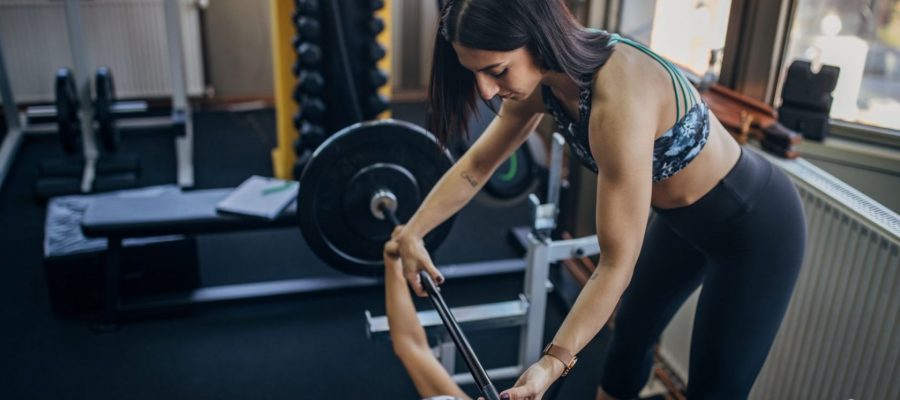All the benefits of someone spotting you while weight lifting, explained.
I managed a new personal best on my squat the other week. Surprisingly, it didn’t take weeks of training, any crucial warm-up drills or a dedicated nutrition programme to support my strength. Rather, I walked up to the bar and lifted about 15% more than I usually do.
What made the difference in that particular session? I had a personal trainer standing behind me.
I was pretty confused by this revelation. I’ve long been an advocate of solo training – thinking the only person I needed to push myself further was me. So when the trainer – who is also a friend – offered to spot me as the gym was quiet and they had some free time, I didn’t expect much to change.
You may also like
Solo vs group workouts: do women prefer exercising alone or with other people?
But I broke through the squat plateau I’d been stuck in for months – without him touching the bar or physically helping in any way. He simply stood behind me, ready to lift the weight if I needed it. Unfortunately, since that day, I’ve crept back into the same plateau range. So why am I so much stronger when I’m with him?
Do you need a spotter at the gym?
A spotter is someone who can assist your lift if needed. They stand close by, ready to take some of the weight if you can’t finish a rep. The unwritten agreement is that spotters don’t help until you’re failing.
But the research suggests that they can still improve your lifts. In a 2019 study from the Journal of Strength and Conditioning, participants performed bench press with a spotter either in direct view or hidden. When spotters were visible, total reps and weight lifted were significantly greater. Interestingly, in the trials with the hidden spotter, participants reported lower self-efficacy.

Researchers suggested that this was because “verbal and nonverbal communication from others influence self-efficacy beliefs”. Essentially, we take other people’s reactions as a judgement on our ability. In this scenario, while the spotters didn’t say anything either encouraging or discouraging, the lifters were aware of whether or not they tried to intervene in the lift. They took the spotters’ lack of intervention as a sign that they had the ability to complete the lift, which gave them the confidence to do so.
There’s also the knowledge of reassurance. I think that knowing that someone is ready to bail me out helped me be more daring with my lift. I don’t like to admit that, maybe, having trust in your body is really difficult, especially when you have kilos loaded onto your back.
Whether or not it goes that deep probably depends on the person. It might simply come down to the fact that we want to impress others. In a 2011 study published in the International Journal of Exercise Science, female lifters added three pounds (1.5kg) to their bench press and nine pounds (4.5kg) to their leg press when being watched by male observers. And men managed to add four pounds (2kg) and 19 pounds (10kg) to their bench and leg press respectively just by being watched by women.
As personal trainer Ben Carpenter recently explained in a video on his Instagram: “As humans, we like appearing competent at the task we’re performing – especially when other people are watching. If you really want to smash a personal best, grab a spotter and lift in the presence of other people.”
That’s good news for those who can’t afford a coach, but also remember that trainers on the gym floor are there to help you. If you want a sure-fire way to improve your lifting, ask one of them to stand by.
Images: Getty
Source: Read Full Article
